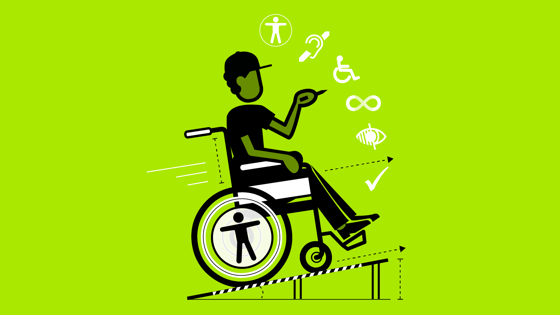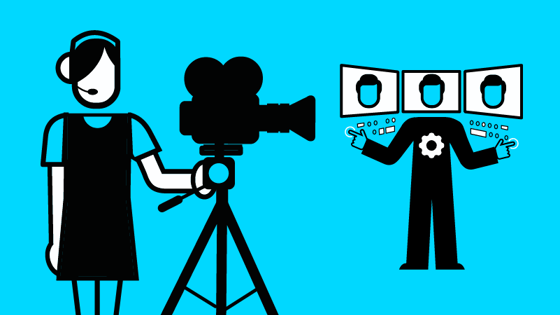Film and TV drama
Access coordinator

What does an access coordinator do?
Access coordinators work with productions to identify barriers to access for all staff, cast, crew and contributors. They also aim to increase the number of deaf, disabled and neurodivergent (DDN) people working in film and TV.
They work at all stages of the production from planning to casting, filming and editing. They give advice on how the drama or programme can include more DDN people. They are there to work out how everything from hotels and scripts to equipment and studios can be more accessible.
They act as a point of contact for the production team and DDN cast and crew. They are not there to make decisions on budgets or act as trainers or support workers, but they do help to bring in specialist staff such as BSL interpreters or medical staff when needed. They also help to find solutions to problems with access and equipment and find suppliers for things like ramps, special software and accessible trailers.
Watch and read
- https://www.screenskills.com/skills-checklists/unscripted-tv/accessibility/access-coordinator-skills/
- https://www.youtube.com/watch?v=I4d3B2SeOTM
- https://rts.org.uk/article/working-lives-access-coordinator-0
- https://www.youtube.com/watch?v=_hLw6yIa6Tg
What is an access coordinator good at?
- · Understanding of accessibility: has a good knowledge of accessibility, specialist training and may have lived experience as a DDN person, knows about the 5 A’s of accessibility – (Anticipate, Ask, Assess, Adjust and Advocate)
- Knowledge of policy and legislation: Understand the Equality Act, Access to Work, GDPR and TAP (the Television Access Project).
- Communication: able to listen to both the DDN person and the production team and come up with workable solutions.
- Understanding of production: understand how film and TV content is made, and the decisions which need to be made throughout the process.
- · Flexibility: able to adapt quickly to the changing needs of the production and the access requirements of the DDN people in the cast and crew.
Who does an access coordinator work with?
The access coordinator works closely with the production management team. However, they need to be able to work with everyone on the production as DDN cast and crew could be working in all departments. This role is also relevant to unscripted TV productions and also related creative industries such as theatre and events.
This job profile was supported by Into Film.
How do I become an access coordinator?
This is an unusual role and there are a variety of routes in. Many people who become access coordinators are DDN actors or crew who have done a specialist training course. They may have lived experience of making their own access requirements known at work and how to find suitable adjustments. They come from all parts of the screen industries, and some have worked in theatre or other parts of the creative industries.
At school or college
If you want to go to university, A levels or Highers in in drama and theatre, English, film studies, or media studies, are useful. Or you might want to take the following level 3 vocational qualifications:
- BTEC National Extended Diploma in Creative Digital Media Production
- BTEC National Diploma/Extended Diploma in Art and Design
- BTEC National Diploma/Extended Diploma in Business
- BTEC National Diploma in Film and Television Production
- BTEC National Diploma in Photography
- UAL Applied General Diploma/Extended Diploma in Art and Design
- NCFE Applied General Certificate in Art and Design
- OCR Technical Diploma/Extended Diploma in Business
- OCR Cambridge Technical Diploma in Art and Design (Photography)
- OCR Technical Diploma in Digital Media (Moving Image and Audio Production)
- AAT Advanced Diploma in Accounting
- Diploma in Production Accounting for Film and Television
- IAO Diploma in Accounting
- T level Media, Broadcast and Production
Get an apprenticeship:
An apprenticeship is a job with training, so it’s a great opportunity to earn as you learn. You might be able to find a production manager apprenticeship, but it can be challenging to find apprenticeships within production companies. It might be worth looking for a job as an apprentice in another branch of the creative industries. You can then transfer into film and TV at a later point.
Check out what’s an apprenticeship? to learn more about apprenticeships and find an apprenticeship to learn how to find one in your region, or approach companies directly. Go to ScreenSkills information on apprenticeships for the main apprenticeship schemes in film and television.
Get a degree:
It’s not essential by any means, but you can have a look at ScreenSkills’ list of recommended courses and select one in film and TV. We recognise courses with our ScreenSkills Select award where they offer training in the relevant software, dedicated time to building a portfolio and have strong links with the film and TV industries.
You may also want to look at courses which would take you into a role in other parts of the creative industries.
Get work experience:
Contact video making and creative companies and ask if you can do work experience with them. See our advice on how to approach employers to learn how to do this. Some employers offer virtual work experience schemes and workshops so do look out for those.
Network:
Go to industry networking events to meet people working in film and TV or other parts of the creative industries. Give people your contact details and ask if you can do work experience. Go to how to network well for some tips. You can also network within the DDN community to find out more about the access needs of people with different disabilities.
Network online:
Create a LinkedIn profile. See if there are Facebook pages or other social media groups for people making films or TV in your area. There might even be groups for runners and trainees. Join them. If you are 18 or over, create a ScreenSkills profile. There are a lot of crewing agencies that will charge you to be on their books. Sign up to the free ones initially. Wales Screen, Northern Ireland Screen and other areas offer free crew databases. Find a film office near you and get connected. If you do sign up to paid sites, make sure they specialise in the areas in which you’re interested.
Become a trainee:
Apply to work in the production department with ScreenSkills’ Trainee Finder scheme.
Take a short course
Once you are working in film and TV or the creative industries you may be able to take one of the specialist courses for access coordinators. You will need this to work on set as an access coordinator in film and TV drama or unscripted TV. There are also introductory webinars, some run by ScreenSkills and some by other organisations.
Take some of our e-learning modules for film and TV especially the Introduction to disability, access and inclusion . Also, the Getting into the screen industries series which is designed to support people looking to get their first break in the screen industries. (Note this series is available for under 18s. Parents or teachers can e mail info@screenskills.com for the link)
All of ScreenSkills current training is here.
Take first-aid and health and safety courses as these will be very useful extra skills to have. Access coordinators do not have a health and safety role on a production, but they may discuss health and safety with those who are responsible for it.
Work or volunteer in accessibility:
You may be able to find an entry level role or a volunteer role which is related to accessibility for theatre, events, your university or college or local charities.
You might also be interested in...
Working as a production coordinator in commercials, music videos or animation. Build up your skills whatever way you can. Alternatively, you could consider being a receptionist or runner in the unscripted TV industry.
Further resources
TAP Hub
PMA (Production Managers Association)
CDN (Creative Diversity Network)
The 1 in 4 Coalition is a collection of disabled creatives in Hollywood
Bridge06 is a Access Consultancy with various resources including this useful document about the AC role. The document was funded by the British Film Commission and co-created by the 1in4 Coalition.






